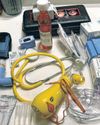CATEGORIES
Categories

CAN AI HELP HUMANS UNDERSTAND ANIMALS AND RECONNECT WITH NATURE? A NONPROFIT RESEARCH LAB THINKS SO
Peeps trickle out of a soundproof chamber as its door opens. Female zebra finches are chattering away inside the microphone-lined box. The laboratory room sounds like a chorus of squeaky toys.

BOEING'S AIRCRAFT DELIVERIES AND ORDERS IN 2024 REFLECT THE COMPANY'S ROUGH YEAR
Boeing delivered less than half the number of commercial aircraft to customers than its European rival in 2024 as the American aerospace giant's output suffered under intensified government scrutiny and a factory workers' strike, according to data released this week.

GOOGLE FACES MORE SCRUTINY AS UK WATCHDOG FLEXES NEW DIGITAL COMPETITION POWERS
Britain's competition watchdog flexed new digital market powers for the first time with an investigation into Google's search and search ad businesses.

NASA PROPOSES CHEAPER AND QUICKER WAY TO GET MARS ROCKS AND SOIL TO EARTH
NASA is pitching a cheaper and quicker way of getting rocks and soil back from Mars, after seeing its original plan swell to $11 billion.

TAIWANESE CHIPMAKER TSMC POSTS 57% SURGE IN PROFIT THANKS TO THE AI BOOM
Taiwan computer chip maker TSMC reported Thursday that its profit in the last quarter rose 57%, buoyed by the artificial intelligence boom.

SUPREME COURT SEEMS LIKELY TO UPHOLD A LAW THAT COULD BAN TIKTOK IN THE U.S.ON JAN. 19
The Supreme Court seemed likely to uphold a law that would ban TikTok in the United States beginning Jan. 19 unless the popular social media program is sold by its China-based parent company.

TAIWAN IPHONE MAKER FOXCONN SETS ITS SIGHTS ON THE EVER MORE CROWDED EV MARKET
Auto industry newcomers like Taiwan-based iPhone maker Foxconn and China's Huawei Technologies are maneuvering to gain an edge in the electric vehicle sector, prompting automakers like Japan's Nissan and Honda to announce plans to join forces against a flood of ambitious competitors.

PRIME VIDEO'S USE OF AI, NEXT GEN STATS ON NFL GAMES IS HELPING VIEWERS UNDERSTAND THE GAME BETTER
The Los Angeles Rams defense appeared to be content to drop back in coverage and prevent San Francisco's Brock Purdy from completing a Hail Mary on the final play of their Thursday night game on Dec. 12.

New Cars
A DEFINING YEAR FOR THE RAPIDLY EXPANDING E-VEHICLE INDUSTRY

AFTER DISASTERS, PEOPLE ARE ESPECIALLY VULNERABLE TO SCAMS. HERE'S HOW TO PROTECT YOURSELF
During natural disasters like wildfires and floods, scammers often emerge to prey on victims.

AGING WELL MEANS HAVING GOOD BALANCE.HERE'S HOW TO PRIORITIZE IT
Taking a shower. Grocery shopping. Moving around the kitchen. Getting dressed. The underappreciated link between these mundane activities is good balance, which geriatricians say is key to maintaining an independent lifestyle as we age.

AMAZON IS ENDING ITS 'TRY BEFORE YOU BUY' OPTION FOR PRIME MEMBERS
Amazon is saying goodbye to “Try Before You Buy.”

US DEFENSE CONTRACTOR TO BUILD 4,000-WORKER ADVANCED MANUFACTURING FACILITY IN CENTRAL OHIO
U.S. defense contractor Anduril Industries is preparing to build a massive advanced manufacturing facility in central Ohio, adding a planned 4,000 jobs to the area's burgeoning high-tech sector, state officials announced Thursday.

TOYOTA'S TRUCK DIVISION HINO TO PAY $1.6 BILLION AS PART OF EMISSIONS SCANDAL
A Toyota division that manufactures trucks will pay more than $1.6 billion and plead guilty to violations related to the submission of false and fraudulent engine emission testing and fuel consumption data to regulators and the illicit smuggling of engines into the United States.

JEFF BEZOS' NEW GLENN ROCKET REACHES ORBIT ON FIRST TEST FLIGHT
Blue Origin launched its massive new rocket on its first test flight Thursday, sending up a prototype satellite to orbit thousands of miles above Earth.

HERE'S WHAT YOU NEED TO KNOW ABOUT CREDIT CARD DEFAULTS
Credit card defaults are on the rise for Americans, reaching the highest level in 14 years. U.S. credit card defaults jumped to a record $46 billion from January through September 2024, according to the Financial Times, citing data analyzed by BankRegData.

TECH TIP: START THE NEW YEAR WITH A CLEAN INBOX
The new year is always a good time to make a fresh start — including with your email inbox. To kick off 2025 with a clean slate, why not clear out all those unnecessary and unwanted messages?

ELON MUSK SAYS A THIRD PATIENT GOT A NEURALINK BRAIN IMPLANT. THE WORK IS PART OF A BOOMING FIELD
Elon Musk said a third person has received an implant from his brain-computer interface company Neuralink, one of many groups working to connect the nervous system to machines.

TIKTOK COULD BE BANNED THIS MONTH.HERE'S WHAT USERS CAN DO TO PREPARE
TikTok has cemented itself as a quintessential entertainment app, offering everything from funny skits and makeup tutorials to social commentary and news.

Trump Is Ready To Bypass Congress
Plans for border and tariffs will push limits of presidential authority

L.A.'s Smoke-Clogged Air Is Sickening Many Children
Soren Frederico's home and everything in it burned down when wildfire ripped through the Pacific Palisades. Days later, he suffered a massive asthma attack that left him struggling to breathe for nearly a day.

Tough Road Lies Ahead for Fragile Deal
To understand the fragility of the Gaza cease-fire deal, look at the past two days of intense negotiations to re- solve last-minute issues. Israeli Prime Minister Ben- jamin Netanyahu finally said early Friday that a deal was done-nearly two days after U.S. leaders and Arab negoti- ators had celebrated it.

Gazans Aim To Rebuild Their Lives
Hoping the truce holds, Palestinians yearn to see relatives and begin recovering

Gazans Aim To Rebuild Their Lives
Hoping the truce holds, Palestinians yearn to see relatives and begin recovering

Notre Dame Star Is Trying to Win Titles in Football and Lacrosse
Jordan Faison will line up at wide receiver against the Ohio State Buckeyes in the national championship game, just a few months after helping the Fighting Irish to a lacrosse title

The American Teen Who Pulled Off a Tennis Upset for the Ages
During the fourth set of his marathon Australian Open match against one of the world's top tennis players, 19-year-old Learner Tien had just one thing on his mind. He desperately needed a bathroom break.

You Never Forget a Fire
When I was a teenager my family's house burned down and every possession but our car was lost.

The Extraordinary Defense of the Getty Museum Against the L.A. Fires
Flames made it to within 6 feet of the Getty Villa and yet it still stands. Inside the museum's decades of planning for disaster preparedness.

An Insider's Guide to New York's Bakery Boom
Right now, you can enjoy some of the city's finest dining on the go—and for under $10—thanks to a new generation of pastry chefs who are changing the game one croissant, cookie and cardamom bun at a time

She Chronicled New York's Wildlife and Its Denizens
Her most famous subject: Pale Male, a hawk whose eviction from a luxury apartment building inspired protests